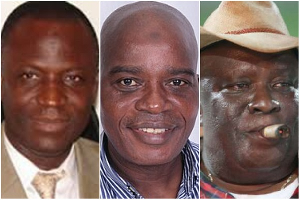By George Sydney Abugri
This week I continued rummaging through the archives in search of anything unusual about Dr Kwame Nkrumah that I had not read or heard before.
I trudged with dogged persistence through his leadership of the agitation and struggle for independence right up to those challenging most immediate post-independence years.
The reasons for Dr Nkrumah’s overthrow had as much to do with a deadly local opposition determined to eliminate him, as it had to do with the discomfiture of a Western World desperate to see the back of a continental “god of Pan-Africanism”, menacingly walking the communist highway.
Dr Nkrumah apparently was not your average candidate for Papal canonisation. On my first day back at home in Bawku on holiday from school in another town, I was walking along the old colonial post office and treasury road, close to the suburb of Gingande, when I saw something that made me gasp:
Seated on the ground across a large barbed wire-fenced enclosure like refugees, were people under guard, some of who were in chains, if I recall rightly.
Among those seated closest to the gate, was a man who had loomed so very large in my early childhood years; The headteacher of the Bawku L. A. Primary school, Mr Iddi Wuni.
I was staring at a makeshift version of one of the many detention camps, which had been opened across the country to take into custody, political enemies of Nkrumah, real or perceived.
District Commissioners had powers to detain Nkrumah’s enemies under the Preventive Detention Act.
A common complaint at the time was that, some District Commissioners had taken advantage of the PDA, to detain all manner of perceived enemies, not excluding men suspected of going after ‘exclusive” concubines of the almighty DCs! Poor Osagyefo! Do you think he would have approved of that?
Nkrumah appears to have been driven to his wits end over the persistent attempts to assassinate him. It sounds linguistically incongruous to talk of bombing a man.
We may make references to the bombing of rebel held territory, but certainly not the bombing of an individual. Yet here was a man who got bombed and bombed again and again, Jomo!
Since the average individual is never in proximity with epoch-making events,I felt a bit strange recalling how the most fatal of the attacks on Nkrumah, the Kulugungu grenade attack, which eventually led to the Osagyefo’s death on a hospital bed in far way Bucharest, occurred only a few kilometers away from where I had stood waving a Ghana flag.
If there was anything curious I came across as I kept rummaging, it was the three wills Nkrumah made. His first will was dated July 4, 1964 and the second will dated June 26, 1965.
The two wills were very much the same, but in the second will, Nkrumah’s initial bequest of 10,000 Ghana pounds to his secretary, Miss Erica Powell, had been deleted. I wonder what happened.
The only other significant difference between the two wills, is Nkrumah’s insertion in the second will, that the executors of the second will, consider offering an endowment of 5,000 Ghanaian pounds to each of “any children of mine begotten not in wedlock, but in accordance with native customary law.”
The Osagyefo had apparently done some oat sowing before Madam Fathiah.
In the first two wills Nkrumah bequeathed 20,000 Ghana pounds to Elizabeth Nyaniba his mother and 5,000 pounds to his driver, Anyatie Patterson. Three of the Osagyefo’s relations, Ambrose Yankey, Mary Ekuamenlah and Efiebah Nkrumah were to receive 10,000 Ghana pounds, 5,000 pounds and 2,500 pounds respectively.
There was a bit of a strange one: Nkrumah bequeathed 10,000 Ghana pounds to “the son of Alhaji Iwa of Kankan, Guinea”. I wonder who the lucky bloke was, and why the Osagyefo did not name him in the will? Who was Alhaji Iwa, do you know?
In the first two wills Nkrumah bequeathed 10,000 pounds to his eldest son, Dr Francis Nkrumah and 10,000 pounds endowments each to his three other children Gokeh, Samiah and Sekou, then aged five, three and one respectively.
The third will which Nkrumah declared to be “my last will” was a bit of a puzzle, at least to me. To begin with the last will was dated February 18, 1966. That was exactly six days before he was overthrown.
Can you beat that, Jomo? Then too, Nkrumah revoked the provisions made in respect of his relatives, mother, wife and children and declared instead that he was bequeathing all his earthly property to the Convention Peoples Party.
The party was to maintain, provide and ensure the upkeep and livelihood of his mother and children.
In my opinion, Jomo, the very least honour the CPP can to do the man’s memory now, is to put together again and fully revamp the party the Osagyefo bequeathed to them, but which they have left as splintered as shattered glass!
Georgeabu@hotmail.com www.sydneyabugri.com
{First published in the Daily Graphic in 2007}
Opinions of Tuesday, 6 March 2012
Columnist: Abugri, George Sydney














